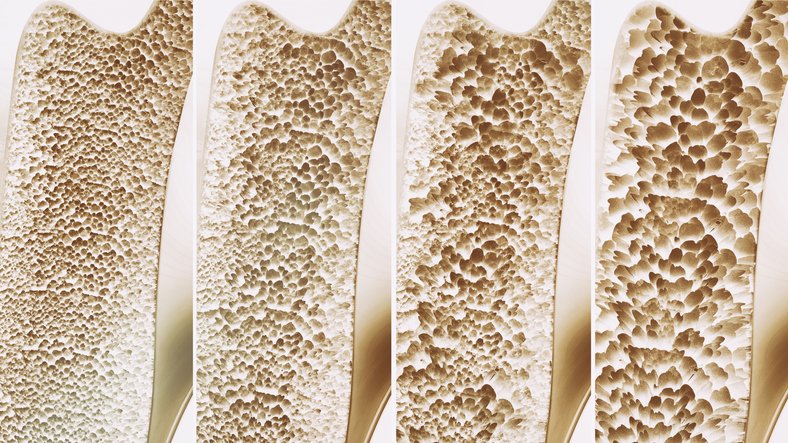Osteoporosis
Osteoporosis affects over 54 million Americans. It is a medical condition that has a significant impact on a person's bone health. Shockingly 50% of women and 25% of men over the age of fifty will suffer from a broken bone due to osteoporosis. It is characterized by a reduction in bone mineral density, which increases the risk of fractures. To understand osteoporosis, it is essential to start with osteopenia, which is a precursor to the condition. Osteopenia indicates lower than normal bone mineral density, but not to the extent seen in osteoporosis. Doctors determine this distinction using a T score, which is determined by a bone scan. A T score between negative one and negative 2.5 suggests osteopenia, while a score below negative 2.5 is indicative of osteoporosis.
Peak Bone Health and Calcium
The peak of bone health is achieved during early adulthood, with men and women reaching their maximum bone density by their late teens and early twenties. However, once we reach the age of 30, a natural decline in bone mass occurs, which is influenced by both genetic and lifestyle factors. Interestingly, a study conducted in 2015 has shown that excessive calcium intake, particularly through supplements, does not significantly benefit bone mineral density in older adults. 1 This finding challenges the common perception of calcium's role in bone health. Additionally, calcium supplementation can be risky. A 2012 study showed a 139 percent increase in heart attacks in those who took calcium supplements and no increase with normal dietary sources of calcium. Other studies show an increased risk of death, kidney stones, and cancer. My previous post covers calcium supplements in more detail if you are interested.
Nutrients For Bone Health
Maintaining good bone health requires a comprehensive approach that involves paying attention to essential nutrients that support bone formation and maintenance. Some crucial nutrients for this process include Vitamins D and K2, magnesium, silica, and collagen. Vitamin D is essential in enhancing calcium absorption, while K2 is responsible for directing calcium to the bones. Magnesium plays a significant role in this process by aiding calcium absorption, while silica supports mineral metabolism. Collagen is also vital in maintaining the structural integrity of connective tissues, which is an integral element in promoting good bone health. By taking a holistic approach to bone health, you can ensure that your body receives all the essential nutrients it needs to maintain strong and healthy bones.
Recent research highlights the significance of not only minerals but also different vitamins, such as B vitamins and vitamins C and E, in sustaining bone density. 2 Tocotrienols, a type of vitamin E, have been recognized as exceptionally advantageous for their anti-inflammatory characteristics, bone turnover support, and improvement of bone microarchitecture. 3
Inflammation and Bone Health
Osteoporosis is a condition that develops due to multiple factors, with inflammation being a significant contributing factor. Chronic inflammation conditions like Crohn’s disease, ulcerative colitis, and rheumatoid arthritis are associated with an increased risk of developing osteoporosis. Gluten intolerance can also impact inflammation and nutrient absorption, which is an example of the complex interactions that affect bone health. Additionally, the gut microbiome plays a vital role in synthesizing critical nutrients for bone health, highlighting the importance of maintaining a healthy digestive system. 4
Gravity To The Rescue
Lifestyle factors such as physical activity and diet are crucial in preventing osteopenia and osteoporosis. Weightlifting is a highly beneficial exercise that stimulates bone remodeling and improves bone density. Adequate sleep, stress management, avoiding smoking, and excessive alcohol consumption are also essential to maintain bone health. 5
Eating For Your Bones
A diet that is rich in nutrients and includes whole foods like animal products, seafood, fruits, vegetables, and fermented foods can provide all the necessary nutrients required for maintaining bone health. However, it's essential to consider the bioavailability of these nutrients, especially calcium, which is critical for strong bones. Although spinach contains calcium, the presence of compounds like oxalic acid can reduce its bioavailability compared to dairy products. Dairy, if you can tolerate it, contains high amounts of calcium. Specific foods and supplements like strontium, found in sea vegetables, can also support bone density. 6 For more information on foods that are good for your bones, go to this website.
Medicines For Bones
Medications used to treat osteoporosis are generally known as bisphosphonates. These medications work by slowing down bone removal, which helps to strengthen bones and prevent future fractures. They can be taken daily, weekly, or monthly, depending on the specific medication and the reason for taking it. In addition, your healthcare provider may also choose to administer IV bisphosphonates through an infusion in your arm, either at their office or an infusion center. The frequency of this treatment may vary depending on the reason for prescribing the medication. According to TheNNT.com, bisphosphonates help one in twenty to prevent vertebral fractures and only one in 100 to prevent hip fractures. 7 Bisphosphonates increase the incidence of osteonecrosis of the jaw. Osteonecrosis is where the bone is so dense that the blood supply is lost and the bone dies. The condition is rare but can occur after tooth extractions and gum surgery. Read this previous post for more information on bisphosphonates.
In summary, preventing and managing osteoporosis requires a multifaceted approach that includes understanding bone health, the importance of various nutrients and lifestyle factors, and the role of inflammation and the gut microbiome. As always, I recommend a whole-foods diet devoid of processed carbohydrates and seed oils, which includes animal-based products along with their fat. Resistance training is important for all ages and should be maintained late in life. If you suspect you have underlying gut inflammation or any other health issues, consult with a functional medicine practitioner. By focusing on a holistic approach to health, individuals can significantly impact their bone density and overall well-being.






